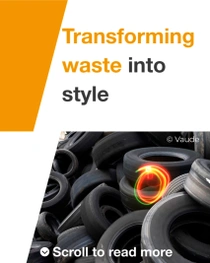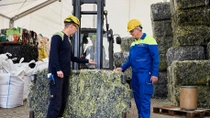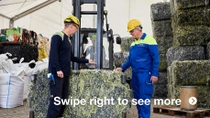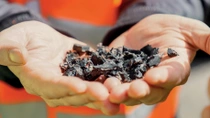We create change
Sustainable style starts with science
At BASF, we are enabling new, innovative solutions to address the challenges of the modern fashion industry. From promoting traceability in cotton farming to recycling old textiles and reducing waste, discover how our teams are paving the way for a more sustainable future in fashion.
Every year, 120 million tons of textile waste end up in landfills, incineration plants, or worse, in the environment. This growing issue is also a waste of valuable raw materials. BASF is tackling this by transforming end-of-life textiles into new materials, promoting true circularity in the textile industry. Polyamides, also commonly known as nylon, are synthetic polymers widely used in fashion and sportswear. Now BASF has developed loopamid®, a new high-quality polyamide 6 produced entirely by recycling discarded textile waste. The technology behind loopamid® enables end-of-life textiles to be turned into valuable raw materials for new clothing.
This reduces the demand for virgin raw materials and helps to lower the carbon footprint of the energy-intensive textile industry. With new technologies like this, BASF is closing the loop on textile waste and helping our customers to reshape the future of sustainable fashion.
The recycled pyrolysis oil is attributed to BASF’s certified Ccycled® products through a mass balance approach, which enables BASF to offer new products to the fashion industry. For example, Ultramid® Ccycled products are used to create high-quality textiles for outdoor and sports apparel, bike bags, and underwear with a lower CO2 footprint compared to conventional fossil-based products. The same is true for PolyTHF® Ccycled, a key raw material used to produce spandex fibers for sportswear, underwear and many other garments.
Movement is essential — to play, to work, to push boundaries. Infinergy®, BASF’s brand for innovative midsole solutions, helps people move with greater comfort and efficiency. Whether in running shoes, safety footwear, or athleisure footwear, its high-energy return and durability reduce fatigue while enhancing performance.
But innovation isn’t just about better materials. It’s about smarter, more sustainable solutions. BASF is finding new ways to substitute fossil feedstock by incorporating alternative raw materials like biogas and pyrolysis oil from chemically-recycled plastic waste into the production value chain. By making use of these circular feedstocks, fossil resources are kept in the ground and waste is turned into value.
From the track to the workplace, Infinergy® keeps people moving — while also helping the world move toward a more sustainable future.




























